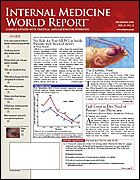Publication
Article
Internal Medicine World Report
Dietary Intake Plays Major Role in Fertility Status of Men and Women
Author(s):
From the American Society for Reproductive Medicine
NEW ORLEANS—Want to have a child? Eat right. That’s the message for your patients, both men and women, suggest several studies presented at the American Society for Reproductive Medicine annual meeting.
Sperm Quality
Eating fruits, vegetables, and phyto-estrogens (soy products) affected sperm quality in a study that included 48 men with abnormal semen analyses and 10 normal controls. The infertile men had been trying to impregnate their partners for 1 year; the controls had fathered a child in the previous year.
More than 80% of the infertile men reported a low dietary intake of fruits and vegetables, compared with only 40% of the controls. Similar proportions of men in both groups took vitamin supplements (40% vs 50%, respectively).
Low intake of vitamin C correlated with a lower sperm count, lower percent motility, and abnormal morphology. Low intake of the antioxidants glutathione and cryptoxanthin was associated with reduced sperm motility as well, reported Vivian Lewis, MD, of the University of Rochester School of Medicine, New York.
Coinvestigator Gyunjee Song, MD, reported that plant phytoestrogens (ie, dietary isoflavones or soy) may also boost fertility in men.
In the same cohort, Dr Song showed that mean levels of the isoflavones genistein and daidzein were higher in the fertile group than in the infertile group. Genistein intake was 1722 μg/day in the controls versus 527 μg/day in the infertile men. Levels of daidzein were 788 versus 241 μg/day, respectively.
Ovulatory Disorders
In women, the use of multivitamin supplements was related to fertility in the Nurses’ Health Study, reported Jorge E. Chavarro, MD, ScD, of the Harvard University School of Public Health, Boston.
The study included 18,555 married premenopausal women, 438 of whom reported infertility caused by an ovulatory disorder. Over 8 years of follow-up, an inverse association was found between frequency of multivitamin use and ovulatory infertility.
In the overall population, multivariate-adjusted relative risk of infertility was:
• 0.88 with consumption of ≤2 multivitamin tablets/week
• 0.69 with 3 to 5 tablets/week
• 0.59 with ≥6 tablets/week.
P
In women who did not use contraception for 2 years, the adjusted relative risk for ovulatory infertility, comparing all users to all nonusers, was 0.47 ( <.001).
“We found that women who regularly took multivitamins had a substantially lower risk of infertility due to anovulation,” Dr Chavarro said. “The risk was particularly low for women who consumed multivitamins most frequently, even after adjusting for numerous factors related to infertility. Women who took multivitamins 6 or more times per week had about a 40% lower risk of infertility due to anovulation.”
Additional analyses pointed to the vitamin B complex, especially folic acid, as the most important component, he added. “Was I surprised? Yes. I was very skeptical,” Dr Chavarro admitted. “I thought the most important factors would be those related to insulin sensitivity, given that most anovulation is seen in women with polycystic ovary syndrome. But no matter how we analyzed the data, the results and the patterns remained. It is now important to replicate these findings in randomized controlled trials.”
In another pilot study, Columbia University researchers showed that cinnamon extract improved insulin resis-tance in women with polycystic ovary syndrome. In the randomized double-blind study of 14 women, 8 weeks of treatment with 1 g (250 mg, 4 times daily) of aqueous extract of cinnamon, which is available in health food stores, was associated with lower fasting glucose levels and improved insulin resistance compared with placebo.
Commenting on these studies, Steven Ory, MD, president-elect of the American Society for Reproductive Medicine, said, “Nutrition and nutritional supplements are of growing importance in reproductive medicine. This kind of research will help us better understand their impact.”






